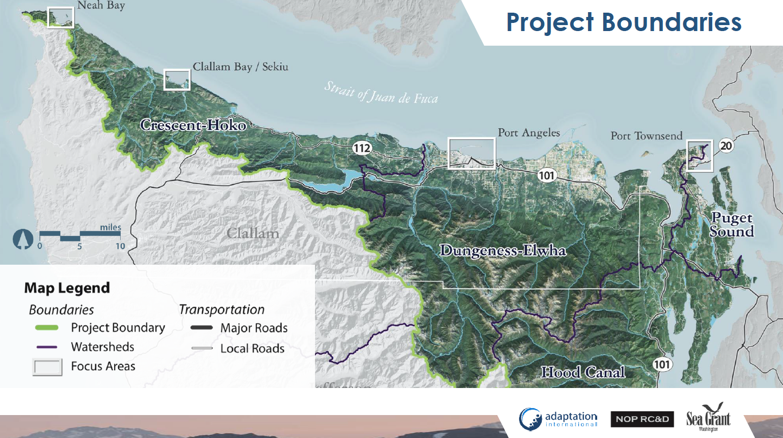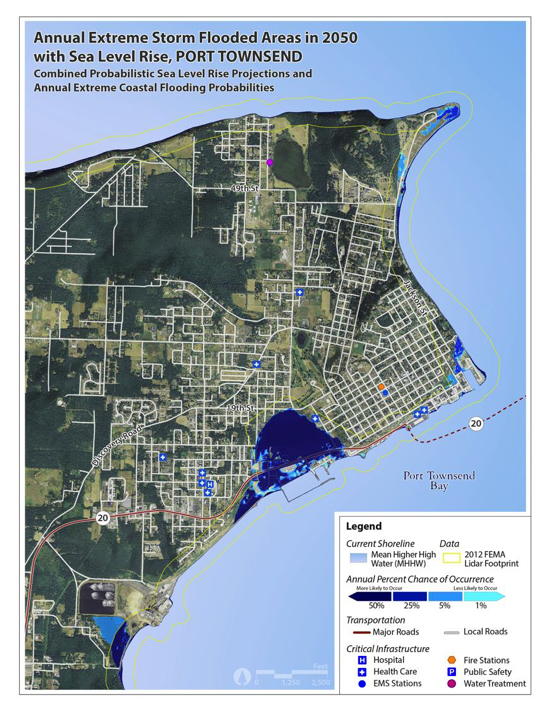- About Us
- Events & Training
- Professional Development
- Sponsorship
- Get Involved
- Resources
Olympic Peninsula Takes Regional Approach to Climate Change AdaptationBy Nicole Faghin, LEEP AP The Ten Big Ideas Initiative is an APA Washington Chapter program designed to bring about far-reaching and fundamental change on a variety of issues. In this series, The Washington Planner focuses on communities taking action to respond to climate change, providing Washington APA members with more information on the work being done and how they can take action in their community. We need to think beyond how to mitigate or reduce climate change impacts. The Olympic Peninsula showcases a local and regional approach for communities planning not only to reduce contributions to climate change (mitigation) but also adapt to impacts. In 2008, Jefferson County and the City of Port Townsend entered into a joint resolution, creating a Climate Action Committee tasked with developing a joint Climate Action Plan (CAP) to reduce greenhouse gas emissions. Focused on the mitigation side of the equation, the CAP recognized the need for a next phase to examine possible impacts and develop adaptation strategies of climate change. At about the same time, other communities on the North Olympic Peninsula (NOP) began questioning how to address climate change threats to the economy, the environment, and the people of the region. In the face of potential increases in temperatures, more coastal storms and forest fires, reduced snowpack and stream flows, and other impacts, adaptation measures needed to be addressed.
The entire process brought together 175 stakeholders over 12 months. Key partners included the NOPRC&D, Adaptation International, and Washington Sea Grant. Other participants included Jefferson and Clallam counties; the cities of Port Angeles, Sequim, and Port Townsend; the Clallam Economic Development Council and Team Jefferson Economic Development Council; Port of Port Townsend and Port of Port Angeles; Clallam Conservation District; the Clallam and Jefferson PUDs; the Jamestown S’Klallam, Makah, and Lower Elwha Klallam tribes; Peninsula College; Puget Sound Partnership’s Strait of Juan de Fuca Ecosystem Recovery Network; and Washington State University. Through workshops with over 100 participants, representing more than 50 different agencies and organizations, and hundreds of additional hours of research, the NOPRC&D Council produced the Climate Change Preparedness Plan for the North Olympic Peninsula with recommendations on adaptation strategies for the three issues; ecosystem (34 strategies), critical water supply (25 strategies), and critical infrastructure (22 strategies). Accompanying the study is a comprehensive plan resource guide with examples for storm water, flooding, building standards, sea level rise, water supplies, and fire.
Through this regional planning process the City of Port Townsend identified four ecosystem, five water supply, and eight critical infrastructure projects. Local recommendations included beginning planning for improved on-site storm water systems, installing tide gates to control flooding, improving forecasting for future water supply and demand, and beginning to incorporate climate change more explicitly into the comprehensive planning and shoreline management program for the city. Heading up the comprehensive planning update efforts for Port Townsend, Judy Surber, Senior Planner for the City, said the regional planning effort provided focus on resiliency and climate change. “We had previously incorporated goals to reduce greenhouse gas emissions (2012). For the 2016 update, Council directed us to incorporate community resiliency concepts throughout the plan. Our participation in the NOPRC&D regional process helped us develop draft goals and policies to increase community resilience.” The NOPRC&D adopted the comprehensive plan update on October 3, 2016. The updated plan contains specific actions to increase resiliency of the community: Land Use Element 2.3.2: Consider opportunities for climate change mitigation and adaptation on natural resource lands and critical areas.
Land Use Element 8.87.1: Consider projected climate change impacts and adaptation strategies when investing in public projects and updating disaster preparedness plans, land use plans and regulations.
Utility Element Policy 19.9: Develop resilient utility systems where planning and investment decisions account for changing conditions, such as climate change, sea level rise, natural disasters, technological changes and increased renewable energy generation.
The regional adaptation planning effort of the NOPRC&D provided a cost-effective way for all North Olympic Peninsula communities to identify their vulnerabilities to climate change and start the process of prioritizing actions to address impacts. As was the case for the City of Port Townsend, the next steps are for communities to put in place specific mechanisms to implement these actions. Stepping up to address climate change at the state, regional, and local levels is one of the Ten Big Idea Initiatives. This work culminated in a short video focusing on the science of climate change, highlighting actions of three local communities, and a Resilient Washington document — 17 written discussion briefs addressing adaptation and mitigation strategies for local governments. The briefs are grouped in three sections — Planning Approaches for Resilience, Strategies for Planning Resilient Communities, and Preparing for Climate-Related Events. The video and discussion briefs can be found at http://www.washington-apa.org/address-climate-change. Return to the January/February issue of The Washington Planner |

 With a 2014–2015 grant from the EPA, the North Olympic Peninsula Resource Conservation & Development Council (
With a 2014–2015 grant from the EPA, the North Olympic Peninsula Resource Conservation & Development Council ( A Port Townsend non-profit organization, Local 20/20, created a
A Port Townsend non-profit organization, Local 20/20, created a 